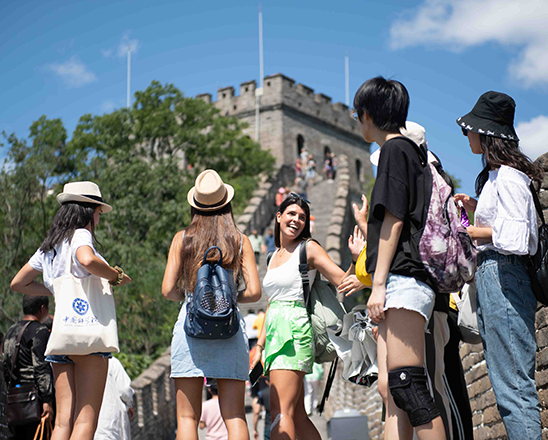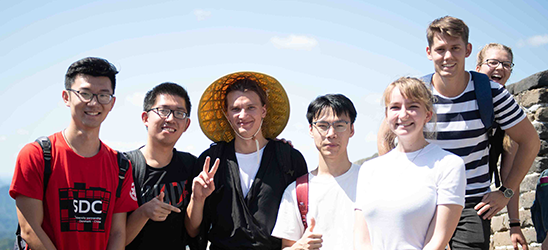🌸 Spring has arrived at SDC 🌸
#sinodanishcenter #spring #yanqihucampus
My trip to Jinan and my Insta takeover has come to an end now. I am headed back to Beijing. I hope I’ve given you a little insight into life as a neuroscience student working on the thesis project. This was just a small glimpse into my life in China—there’s so much more to it!
I’d be really happy to answer any questions about living in China or studying neuroscience. You’re more than welcome to reach out to me on my private account @nilukshi_gopinathan
I’ve really enjoyed doing this takeover and hope it helped you even just a little.
Thank you for following along!
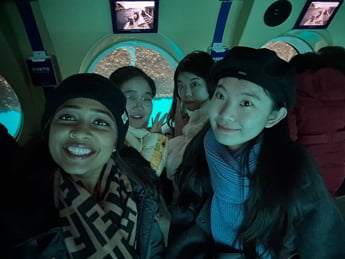
The Neuroscience program is known to be a very tough and intensive program, but that doesn’t mean you don’t have time to travel or any free time at all. The semester is packed, but we do have public holidays and weekends. Both summer and winter breaks are quite long. Since I started at SDC, I’ve traveled to many places and have also been home twice a year—so no worries, there’s definitely time for traveling.
One thing you might notice, though, is that compared to other programs, we don’t have much self-study time. Students from other programs often travel during their self-study periods, so it might seem like they’re traveling a lot more than the neuroscience students—but we are just more brainy🧠
At the lab, it’s a bit different. Since I only have one year to complete my thesis project, I’ve chosen to take fewer holidays. I usually plan a break whenever I feel like I need one, after discussing it with my supervisor. So during regular public holidays, I usually keep working. But that’s totally up to you—you’ll figure out your own rhythm.
In the lab, they understand that you’re an international student and won’t expect exactly the same as from Chinese students. If they do, it’s really important to talk with your supervisors and sort it out right away. At the end of the day, it’s what you make it to - and don’t hesitate to talk about any difficulties in your lab with your supervisors!
I’ve uploaded some pictures from my travels!
1️⃣ We traveled to Jeju Island during our exam preparation December 2023
2️⃣ I traveled to Sri Lanka to join my mom to visit family, January 2024
3️⃣ Traveled to Malaysia
4️⃣ A weekend trip to Chengde
5️⃣ & 6️⃣ From Korea and Japan, July 2024
7️⃣ & 8️⃣ From Vietnam and Singapore March 2025
The University of Chinese Academy of Sciences is hosting the UCAS International Summer School 2025 under the theme “Earth Science for a Shared Future.”
🔎 What’s in store:
✅ Hands-on learning at UCAS and CAS institutes
✅ Access to world-class labs and research teams
✅ A global community of young talents shaping the future of our planet
The summer school for international full-time undergraduate, graduate, and doctoral students will take place online and in Beijing:
Online: 25 June – 1 July 2025
Onsite Research Project: 5 July – 11 July 2025
The onsite research projects will be conducted at a wide range of host institutions. The students can choose between among others Institute of Geographic Sciences and Natural Resources Research, Research Center for Eco-Environmental Sciences and Nanjing Institute of Geology and Palaeontology.
More information - go to UCAS’ website👇👇
https://english.ucas.ac.cn/
📅 Application deadline: 30 April 2025

I’ve received a lot of questions about the Neuroscience and Neuroimaging program—especially about the workload, lectures, exam periods, and whether there’s time for traveling.
To be honest, the first semester was tough. Adjusting to a new country, having classes every day from 8:00 to 15:00/16:00 (unlike Denmark, where there’s more self-study), and the exam structure—all took some time getting used to. Instead of having all exams at the end of the semester, we took two courses at a time, finished with exams, and then moved on, which I also needed to adjust to. Coming from a biological background, learning coding, physics, and machine learning was also quite challenging.
How did I manage?
Over time, I actually started to like the exam structure since it allowed me to focus on fewer courses at once. Studying at SDC after class made it easy to get help from classmates, and by the second semester, things felt much smoother—I had a routine, knew how to plan my time, and studying became more enjoyable.
Exam prep was surprisingly fun!
We usually studied in groups, helping each other stay motivated. We planned our study sessions in advance, brought snacks, and took breaks to play Ultimate, volleyball, or badminton—or just nap! These pictures were taken during our exam prep. Studying can also be fun!😊📚📖
𝗜𝗻𝗳𝗼 𝗺𝗲𝗲𝘁𝗶𝗻𝗴 𝗮𝗯𝗼𝘂𝘁 𝘁𝗵𝗲 𝗠𝗦𝗰 𝗶𝗻 𝗜𝗻𝗻𝗼𝘃𝗮𝘁𝗶𝗼𝗻 𝗠𝗮𝗻𝗮𝗴𝗲𝗺𝗲𝗻𝘁
Chinese culture, dim sum, fellow students from all over the world and an attractive professional profile.
You can have it all while studying a semester or a double Master’s degree in Innovation Management at SDC in China.
Stop by the info meeting, have some cake and get inspired!
𝗣𝗿𝗼𝗴𝗿𝗮𝗺𝗺𝗲
📌 Introduction to the Innovation Management programme
Head of studies, Associate Professor Dmitrij Slepniov, Aalborg University
📌 Meet a student – joining online from campus in China
📌 Ask all of your questions
📅 When: Monday 7 April 2025, 15:00- 16:00
📍 Where: 25.1-035, Teorirum 25.1 , Building 25, Ground floor, Roskilde University
👇Sign up here, and we will make sure we have enough cake👇
https://tilmeld.events/infomeeting-innovationmanagementinchina
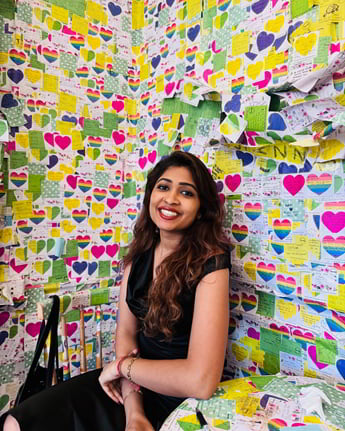
Hi everyone🤗! I’m Nilukshi, currently doing my thesis work at the Institute of Psychology in Beijing👩🏽🔬. I started at the Sino-Danish Center (SDC) in 2023, completed my first year, and then embarked on my thesis project. My research focuses on social memory, utilizing advanced technologies to enhance our understanding of brain function.
A little about me: I’m from Vejle, Denmark, and earned my bachelor’s degree in Biomedicine from the University of Southern Denmark (SDU) in Odense. After my undergraduate studies, I felt a bit uncertain about my next step. I did not know what to do, but then I miraculously came across the Neuroscience & Neuroimaging program at SDC - and here I am now, almost (or trying to) finish my thesis👩🏽💻
This week, I’m excited to share bits and pieces of my life in Beijing—from lab work and experiments to daily experiences in this vibrant city. But life isn’t just about research! I’ll also give you a glimpse into my free time activities, how I navigate living in a different country, and the social life here. Plus, I’ll take you along on a weekend trip with some of my classmates.
Looking forward to sharing this journey with you!
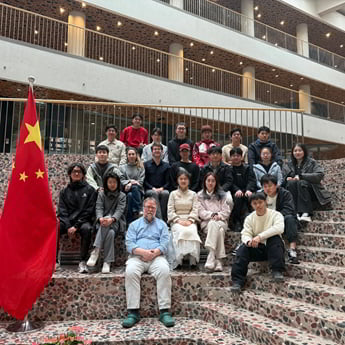
Coming to China for a semester was a no brainer for me, however it's not just packing your luggage and taking the next plane. A lot of preparation went into getting out here. This included getting all the documents, and apps set up before leaving. Like payment apps, amap for navigation as well as translators for getting around in general. 🇨🇳
However no matter how prepared you are it's always nice to have someone to help. At SDC there's plenty of help to be found, from the moment I arrived I was welcomed by my fellow international students with open arms. They helped me get set up with everything I was missing, like bedding in the dorm, due to not being able to order the simple furniture package as semester student. But also more practical things like how to recharge your student card so you can buy food in the canteen. Whilst my Chinese classmates helped me get a sim card and with more complicated communication issues. 🏮🥳
From solving these issues friendships quickly form, not just within your programme but across all of SDC. That's why I had the joy of being invited along to social events or badminton sessions, even though I've barely been here for two weeks.🏸🥳
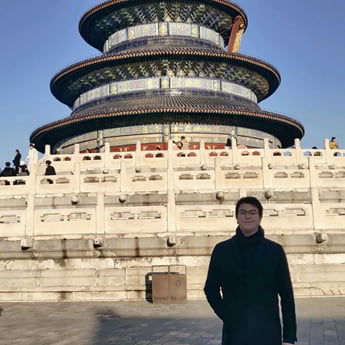
大家好, hello, hej and moin. My name is John and I'm a newly arrived semester student at SDC in the Nanoscience and Technology programme. 🧑🔬
This week I will take over SDCs Instagram account and show you my student life at the UCAS Campus in northern Beijing.
A little bit about me: I'm originally from the Danish minority in northern Germany. I've lived in Aarhus for 6 years where I got my bachelor's degree in Physics and Astronomy and currently am doing my masters in Nanoscience. My focus is on material science, specifically the electronic properties of nano sized solid-state systems for chips in quantum computing. ⚛️
As for hobbies, I love playing Badminton, travelling around places new to me and just having a good time with friends.
And as for friends, there are plenty to be made at SDC where even though I am 'the new guy' everyone has been extremely kind and helpful in getting me settled in and set up as fast as possible.
Why SDC and why just one semester? Is the question I've been asked most since my arrival. I always wanted to come to China for an extended period of time. Through commitments back in Aarhus and the focus of my degree it made most sense to join for just the second semester.
This week I will take you along my daily life and experiences here at the campus and share some of the adventures I already had in my first two weeks in China.
I have attached a couple of photos from my week in Beijing where I played tourist before arriving at SDC and got to see the Temple of Heaven and taste delicious Hunan hotpot with my new classmates. Also a little insight into how it looked inside the classrooms during our Ideathon event. 🇨🇳🏮
Looking forward to take you along, and feel free to ask any questions 🤓
